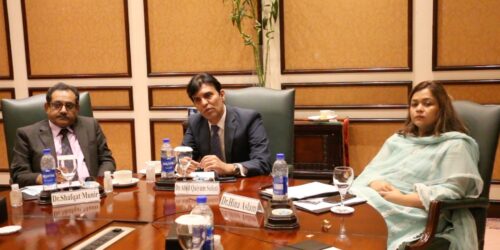Islamabad (30 October 2021): Pakistan is all set to have a diverse representation at 26th Conference of the Parties (COP-26) to the United Nations Framework Convention Climate Change (UNFCCC). The international conference is going to have an extraordinary representation of civil society, parliamentarians, think tanks and private sector from across the globe. The key negotiations at the COP-26 would open up with debate on developing countries plight of bearing the brunt of environmental degradation caused by the developed countries. Dr Abid Qaiyum Suleri, Executive Director Sustainable Development Policy Institute (SDPI), said this during a pre-COP-26 briefing held by SDPI.
He added further that the developed countries during the moot would focus on emerging economies like China, India, Brazil, and South Africa to reduce their carbon emissions and provide a financing work plan for chipping in global climate change mitigation efforts.
Dr Shafqat Munir, Director Resilient Development Programme, SDPI, while moderating the briefing highlighted the key features of the SDPI’s study on Green Recovery during Covid-19 in Power and Energy Sectors. Dr Hina Aslam and Dr Sajid Amin, authors of the study, underpinned the outcomes and recommendations of their research that suggested an ambitious opportunity to convincingly reduce emissions and debt burden through investments in renewable energy projects.
Earlier, SDPI held a discussion ‘Green Financing and Economic Recovery of Pakistan’ in the backdrop of climate goals for COP26. The speakers on the occasion shared their thoughts around the topic, especially on the importance of clean energy transition for Pakistan.
Secretary Power Division, Ministry of Energy, Mr Ali Raza Bhutta, asserted that the Energy mix of Pakistan is very healthy as around 29% of electricity is coming through Hydropower. Likewise, the contribution of solar, wind, and biogas is projected to increase significantly in the coming years.
Mr Shah Jahan Mirza, Managing Director, Private Power, and Infrastructure Board (PPIB) informed the participants that the Government of Pakistan has shown a strong commitment towards increasing the share of renewable energy through HRE Policy 2019 which targets to increase the renewable energy share in power generation to 20% by 2025 and 30% by 2030.
Dr Sardar Mohazzam, Managing Director, National Energy Efficiency and Conservation Authority (NEECA) explained the role of Energy efficiency and conservation in green recovery and said that it has been missing from the landscape of energy planning. Mr Faisal Sharif, Director, Project Appraisals, Private Power & Infrastructure Board, suggested that the green stimulus can accelerate the transition towards green and clean energy, simultaneously spurring green economic recovery and growth, creating millions of jobs, and putting emissions into structural decline.
Mr M Ali Kemal, Chief SDGs, Planning Commission of Pakistan, emphasized on the debt swaps and green financing mechanisms to support green recovery from Covid-19. Ms Kashmala Kakakhel, Climate Finance Specialist, was of view that green recovery is not only about Net Zero and needs to further address all the relevant SDGs of the country such as Poverty.
Mr Hartmut Behrend, Coordinator Pakistan-German Climate and Energy Initiative, Deutsche Gesellschaft für Internationale Zusammenarbeit (GIZ), Dr Sajid Amin Javed, Research Fellow & Head, Policy Solutions Lab, SDPI, and Dr Hina Aslam, and Dr Fareeha Armughan, also shared their views with the participants, especially around green financing, and climate finance mechanism.







